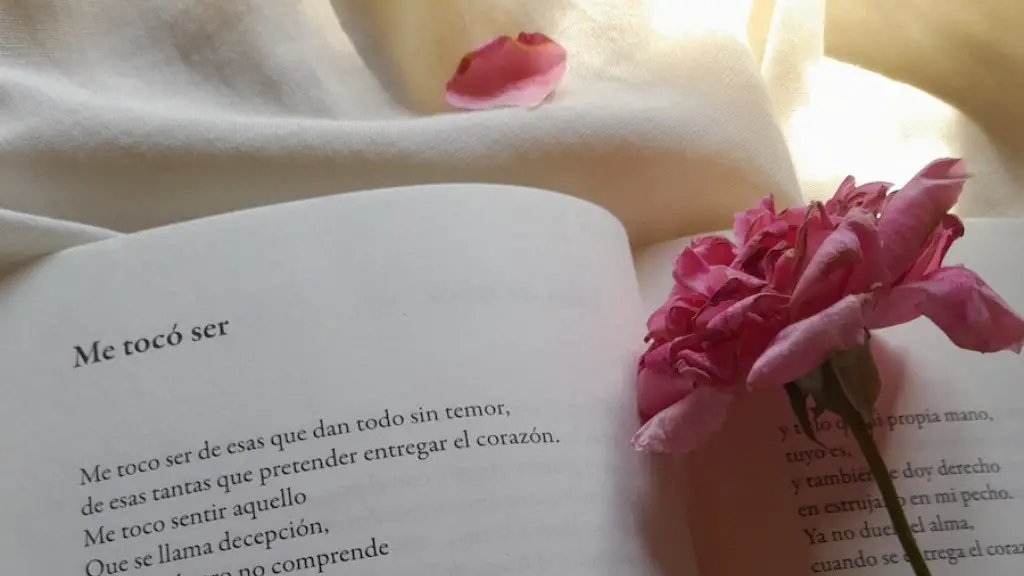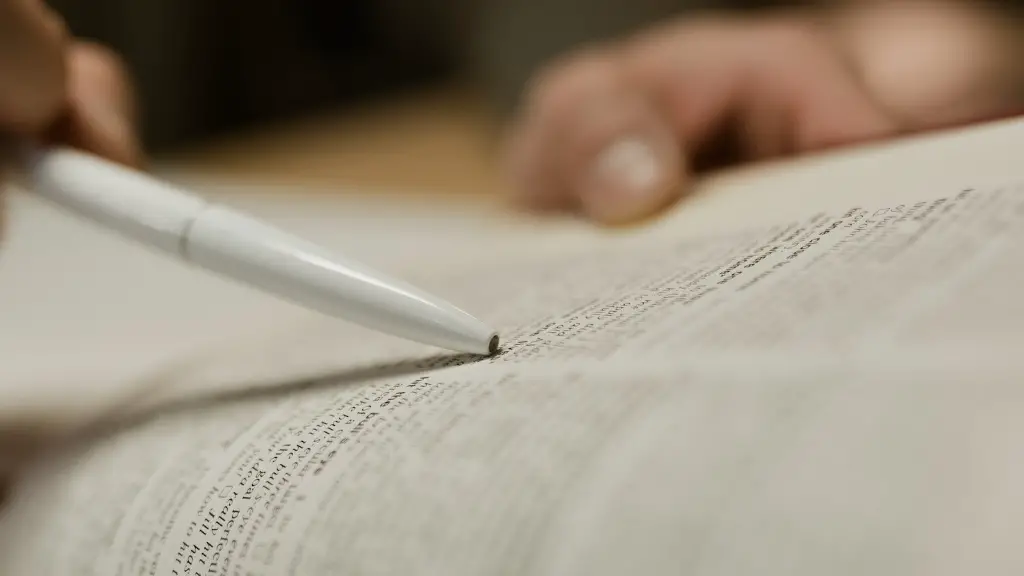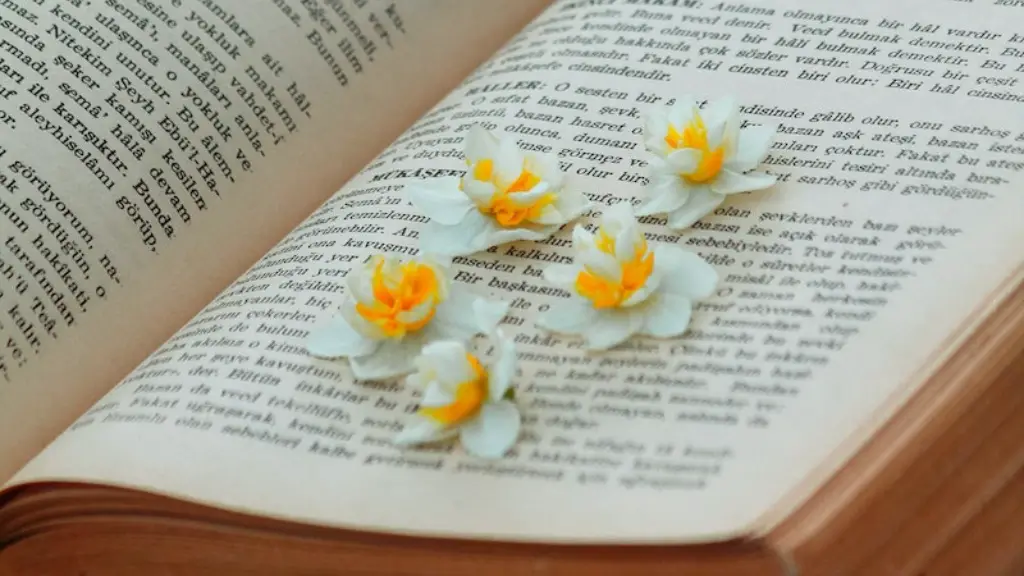Origins and Influences of Modernist Poetry
Modernist poetry began in the 19th century, when poets sought to break away from traditional Victorian poetry. It was influenced by the European avant-garde, particularly French Symbolism, as well as the ideas of Friedrich Nietzsche and Sigmund Freud. Modernist poets drew inspiration from the cubist painters, surrealist poets, and abstract expressionists of their era, rejecting the conventions of conventional society.In particular, they sought to strip away narrative, rejecting the idea of poetry as a linear story. They used poetry as a means of exploring language, and the inner world of the mind.
Leading poetic figures of the time included William Butler Yeats, Ezra Pound, T.S. Eliot, Wallace Stevens, and e.e. cummings. Yeats drew inspiration from Celtic mythology, and his experimental style sought to explore the subconscious. Pound and Eliot sought to push the boundaries of language and structure, both inspired by Eastern religious texts and modernist theories of fragmentation. Stevens was a philosophical poet whose vision was shaped by his studies of the French Symbolists, while Cummings mixed traditional meter with language play. All these poets influenced the development of modernist poetry.
Modernist Poetry Innovations
Modernist poets made numerous innovations to the conventional norms of the time. They experimented with form, disrupting syntax and rhythm to evoke a more immediate emotional response. They sought to portray the inner workings of the mind, often making use of metaphor and allusion to express the inexpressible. They also looked beyond verse to explore the possibilities of prosody, creating works that often crossed the boundary into prose. Above all, they sought to move away from conventional morality and explore the complexities of modern life, reflecting the chaotic and unsentimental reality of the modern world.
In addition, modernist poets often sought to draw on their own personal experiences. This often meant writing from a limited perspective, resulting in a focus on the individual, rather than the communal voice of traditional poetry. They sought to capture the fleeting nature of an emotional state, aiming to present the immediacy of inner experience, with its contradictions and ambiguities.
The shift to modernism in poetry marked a major turning point in the history of the genre. It meant that the rigid structures and conventions of poetry were no longer seen as the only acceptable form. Rather, poets had the freedom to experiment with language and structure, and to explore the inner world of the mind. This allowed them to create works that were groundbreaking and innovative, paving the way for later movements such as the New York School and the poets of the Beat Generation.
The Impact of Modernism on Poetry Today
The influence of modernist poetry is still felt in contemporary poetry. Many poets draw on its techniques, using the disruption of syntax and rhythm, the exploration of the inner realms of the mind, and the focus on the individual. What’s more, many of the leading poets of the 20th century, such as Sylvia Plath, Robert Lowell, John Ashbery, and Anne Sexton, were heavily influenced by modernist approaches.
Modernist ideas also continue to shape the way we think about poetry today. By questioning conventions, modernist poetry made it possible for poets to explore topics that were previously taboo and gave them the freedom to experiment with form, content, and structure. The modernist emphasis on the individual and the exploration of the inner world of the mind has also resulted in a focus on the personal in contemporary poetry, allowing poets to explore their own experiences in a range of innovative ways.
The Legacy of Modernist Poetry
Considering their innovations, it is no surprise that the works of the modernist poets remain highly influential. Many of the leading figures of the modernist movement, such as Eliot and Pound, are still widely read and studied. Their experiments with language and structure have had a huge impact on the canon of modern poetry, and their influence can be seen in works from across the globe. Moreover, their works have been the source of enduring inspirations for poets, from Frank O’Hara to Marianne Moore.
Modernist poets have left a lasting legacy. Through their experiments with language, structure and form, they led the way for innovation in the 20th century and beyond. Their commitment to exploring the inner workings of the mind and the individual has made them a major influence on contemporary poetry. As such, their works continue to provide inspiration for poets, and to shape the way we think about poetry today.
Experimentations in Language
Another key element of modernist poetry was its experimentation with language. This ranged from the disruption of syntax and line lengths, to the incorporation of foreign words and phrases. Poets often sought to create a unique language that could express the complexity of the modern world, and to reveal the hidden meanings in words. For example, Pound drew on his studies of Chinese, Japanese and Anglo-Saxon to create an innovative language that incorporated multiple layers of meaning. Similarly, Eliot and Yeats often used archaic phrases to create an atmosphere of mystery and ambiguity.
Modernists also sought to reflect the complexities of the real world in their poetry. By using innovative techniques such as symbolism, epiphany and fragmentation, they sought to capture the essence of reality in a way that traditional poetry could not. This was a revolutionary idea at the time, and it has had a lasting influence on the way we think about poetry today.
Poets of the Modernist Movement
The modernist movement is associated with a number of leading figures, who went on to become some of the most influential poets of the 20th century. These include William Butler Yeats, Ezra Pound, T.S. Eliot, Wallace Stevens, and e.e. cummings. Although these poets had different approaches to poetry, they all worked towards the same goal: to break free of the conventions of the past, and to explore the boundaries of language.
Yeats was particularly interested in Celtic mythology and creating an atmosphere of mystery and ambiguity. His works often focus on the themes of life and death, love and loss, and he sought to capture the mystery of life in his verse. Pound, Eliot and Stevens are all associated with what has become known as the modernist ‘trinity’, using their works to explore the complexities, ambiguities and nuances of modern life. Cummings, on the other hand, was a poet of metrical experimentation, who sought to create patterns of language that capture the energy of everyday speech.
The Evolution of Modernist Poetry
The modernist movement has had a lasting influence on the evolution of poetry, and its ideas continue to shape the way we think about the genre today. As the modern world has become ever more complex, poets have continued to explore the nuances, ambiguities and inner workings of the mind, creating works that reflect the experience of living in the contemporary world. What’s more, modernist techniques such as fragmentation, symbolism and language experimentation have become a key part of the poet’s toolkit, and continue to be used by poets today.
Modernist poetry has left an indelible mark on the history of the genre, and is one of the key movements in the evolution of poetry in the 20th century. Its exploration of the individual and the inner workings of the mind has made it a major influence on contemporary poetry, and its influence is still felt today.
Exploring the Boundaries of Language
One of the key elements of modernist poetry was its exploration of the boundaries of language. Rather than relying on traditional language, modernist poets often sought to create their own language, disrupting syntax and exploring the nuances of words. This often meant incorporating foreign terms, or creating a new language that allowed the poet to express their ideas in a way that traditional language could not.
Their experiments with language have had a lasting impact on the way we think about poetry and language today. By pushing the boundaries of language and exploring the nuances of words, they opened up an entire new world of possibility for poets.
Modernist poets also sought to explore the meaning of language, often using symbols and metaphors to convey the inexpressible. By doing so, they sought to capture the complexity of reality, allowing the poem to become more than the sum of its parts.
The Significance of Modernist Poetry
Modernist poetry has had a lasting influence on contemporary poetry and the wider genre. Its embrace of the inner workings of the mind, its experimentation with language, and its focus on the individual have all contributed to its enduring legacy. Its innovations have led the way for later movements such as the New York School and the poets of the Beat Generation, and its influence can still be seen in works from across the globe.
Ultimately, modernist poetry has been a groundbreaking movement that has influenced the way we think about the genre today. Its emphasis on experimentation, the exploration of language, and the exploration of the inner world of the mind make it an enduring source of inspiration for poets, and a major influence on the evolution of poetry.





